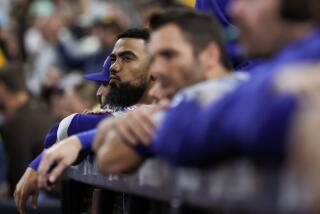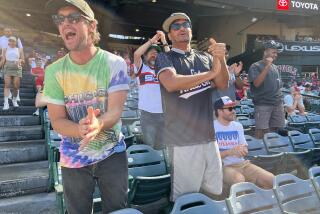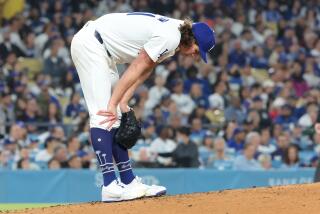COMMENTARY : Red Sox Are a Major Disappointment
- Share via
Were they really a half-game back and destroying everything in their path only 11 days ago?
What a terrific tease.
The Boston Red Sox aim to please.
But didn’t.
They will tell you how the loss of Jeff Gray to strokelike symptoms brought them together. They will tell you how they fought the natural urge to quit, to go through the motions, if not the emotions, of caring. They may even suggest that theirs was a gritty comeback, from 11 1/2 games back Aug. 8, to a half-game back Sept. 21, before it all fell apart.
September was a captivating closing rush, but don’t be deceived. The 1991 Red Sox have been a major disappointment. Not a colossal flop such as “Heaven’s Gate” or “Ishtar,” but a disappointment nonetheless. They weren’t even a .500 team for two-thirds of the season, and after their game with the Tigers Wednesday night, their 159th of the season, they were a .504 team (66-65) in games in which Roger Clemens did not get the decision. That is hardly the hallmark of a first-rate team.
The Red Sox were only first-rate when it came to spending: Their $32 million payroll, which included multimillion-dollar deals for free agent designated hitter Jack Clark and pitchers Danny Darwin and Matt Young, both busts, caused one Boston sports writer to dub them the Gold Sox.
But they rarely glittered, and often played as if they were paid in gold bars that they strapped to their aching backs. For most of the season, the Red Sox weren’t having much fun and neither were their fans. They were a lifeless bunch. Most of the boos they received were deserved.
The Red Sox won the American League East in 1986, ’88 and ’90. Anybody who knows the difference between odd and even could have predicted that no matter who they signed in the off-season, 1991 wouldn’t be their year.
That, of course, is ridiculous. The only numbers that count are the ones the Red Sox did, or didn’t, put up. Darwin had pneumonia and a rotator cuff injury and was 3-6 with a 5.16 ERA. Young continued to display his own mysterious brand of bad karma and was 3-7 with a 5.18 ERA. It’s probably not fair to put these two in the same paragraph, but for different reasons, both were huge disappointments.
Joe Hesketh? In Winter Haven, Manager Joe Morgan wasn’t even sure he’d make the team. Yet were it not for Hesketh’s (12-4, 3.28 ERA) stunning emergence as the No. 2 man in the rotation, General Manager Lou Gorman might have been tempted to do the wrong thing and trade a top prospect such as Phil Plantier for a thirtysomething starter who would pay only short-term dividends.
Fortunately for the Red Sox, Mike Gardiner and Kevin Morton came up from Pawtucket and provided some of what Greg Harris, Dana Kiecker and Tom Bolton had supplied the 1990 staff. It’s a good thing they did because Harris, Kiecker and Bolton faltered, as journeymen often do. Because Gardiner and Morton filled part of the hole, the Red Sox were spared the potential stupidity of turning Plantier into this year’s Jeff Bagwell.
It may not have been a great year for the parent club, but it was a banner year for Pawtucket. Before Plantier began playing like an All-Star, Mo Vaughn was called up when the Red Sox were crumbling in midseason and became a one-man wrecking crew, however briefly.
Tony Fossas, a spring training invitee, did a marvelous job of picking up the slack for Gray. But ultimately, it was the bullpen that blew up as the Red Sox played themselves out of contention by losing six of seven games to the Yankees, Orioles and Brewers last week.
For all intents and purposes, the decline and fall started with Roberto Kelly’s home run off alleged ace closer Jeff Reardon two Sundays ago, and ended with Reardon blowing Sunday’s eighth inning lead in Milwaukee, the Brewers hitting him as if he were pitching batting practice.
In between, Harris turned the nightcap of a sure sweep of the Orioles into a horror show and Fossas and Dennis Lamp fanned flames they are paid to douse.
It was a fairly amazing turnabout, considering the Red Sox had won 31 of 41 games and pulled to a half-game of the Blue Jays. And considering that the schedule the final two weeks of the season seemed to give the Red Sox a lopsided advantage: They played the American League East sad sacks, while the Blue Jays were force-fed a steady diet of American League West clubs and an unwelcome look at most of the league’s best pitchers.
But it didn’t work out for the Red Sox, and the reasons why started in April, not late September. Luis Rivera shares the lead for most errors (24) by a major-league shortstop. Jody Reed had a lousy first half; Ellis Burks had two lousy halfs. Mike Greenwell hit only nine home runs.
Carlos Quintana (.299), next to Wade Boggs and Greenwell the best-hitting regular, got the rawest deal, being platooned and benched at mid-season while Clark and Tom Brunansky weren’t hitting .220. Clark (27 home runs, 85 RBI, .243 average) came around in the second half of the season, and his presence was seen as a positive force in the clubhouse.
So was Tony Pena (.230), but he’s hitting 43 points below his lifetime average. He’s going to catch 140 games this season, and at 34, that may be asking too much.
The same can’t be said for some of his teammates. When the season started, these usually cautious ballplayers were awed by their own lineup.
The results have been somewhat less than awesome.
More to Read
Go beyond the scoreboard
Get the latest on L.A.'s teams in the daily Sports Report newsletter.
You may occasionally receive promotional content from the Los Angeles Times.










